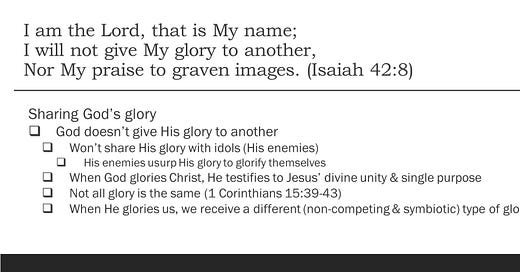God doesn’t give His glory to another
Won’t surrender His glory to His enemies
God reveals to Isaiah a simple principle about His glory that all believers must understand. God doesn’t share His glory with His enemies. He has no desire to make His enemies appear more successful. He won’t enhance their reputations with His own works. Whatever God does, He does with wisdom, righteousness and well…style. The virgin birth, parting of the Red Sea, resurrection of Jesus were masterful strokes. He doesn’t allow false gods to take credit for His actions.
This warning in Isaiah 42 prevents believers from alternating their loyalties between the Lord and the world. The people of Israel in Isaiah’s time retained a weak devotion to the Lord while attentively serving the pagan idols of the sun and moon. God reminds them of the difference between Himself and the idols while revealing the works of the Messiah to Isaiah:
I am the Lord,
I have called You in righteousness,
I will also hold You by the hand and watch over You,
And I will appoint You as a covenant to the people,
As a light to the nations,
To open blind eyes,
To bring out prisoners from the dungeon
And those who dwell in darkness from the prison. (Isaiah 42:6–7, NASB)
Then, the Lord touches on this idea of sharing His glory:
I am the Lord, that is My name;
I will not give My glory to another,
Nor My praise to graven images. (Isaiah 42:8, NASB)
Why connect this idea of glory to the Messiah? For the people of Isaiah’s time, it proves that the Messiah doesn’t oppose, deny or replace God. They will work together. For those in the New Testament, it demonstrates the equality of the Messiah with the Father in the Godhead – Trinity.
By contrast, Isaiah discusses the failures of Israel later in the chapter:
For My own sake, for My own sake, I will act;
For how can My name be profaned?
And My glory I will not give to another. (Isaiah 48:11, NASB)
God cannot share His glory with the people of Israel because their behavior functions contrary to God’s purpose and His glory. Instead of bringing Him glory by their good works, they bring Him glory through His merciful withholding of the judgment that they deserve. If He acted according to His justice, He would have destroyed the entire nation (Isaiah 48:9). He couldn’t refine them like one carefully refines silver (Isaiah 48:10) because they have no precious metals remaining in them. He sends affliction to punish them instead.
Glorifying Israel at that time would profane His own name (and reputation). Thus, we find that He waits until the end of the age before He glorifies Israel.
His enemies seek their own glory, or they attempt to usurp His glory to their own purposes. He opposes all such actions.
I heard these passages preached before about God not sharing His glory. They were preached as absolute truth without exception or nuance. Anything that receives glory (or attempts it) is heretical to Christianity. When we come to the passages about Christians receiving “glorified” bodies or the Son receiving glory from the Father, I got confused. How can God share His glory? How can He glorify His people?
Now, I realize that this passage (Isaiah 42) is more complex than a simple prohibition. There are different types of glory:
All flesh is not the same flesh, but there is one flesh of men, and another flesh of beasts, and another flesh of birds, and another of fish. There are also heavenly bodies and earthly bodies, but the glory of the heavenly is one, and the glory of the earthly is another. There is one glory of the sun, and another glory of the moon, and another glory of the stars; for star differs from star in glory. So also is the resurrection of the dead. It is sown a perishable body, it is raised an imperishable body; it is sown in dishonor, it is raised in glory; it is sown in weakness, it is raised in power (1 Corinthians 15:39–43, NASB)
God has created His creatures with a certain degree of glory. Man has a higher glory than animals. Woman has a different type of glory than man (1 Corinthians 11:7). Some stars are bright. Others have beautiful colors. Each one has different types and degrees of glory.
God’s glory doesn’t exclude His creatures or His people. He includes all of His allies in His glory so that they all benefit. His glory is symbiotic. It helps people by placing God in the correct position of leadership over creation. His glory establishes His justice and mercy. His glory is wonderful!




